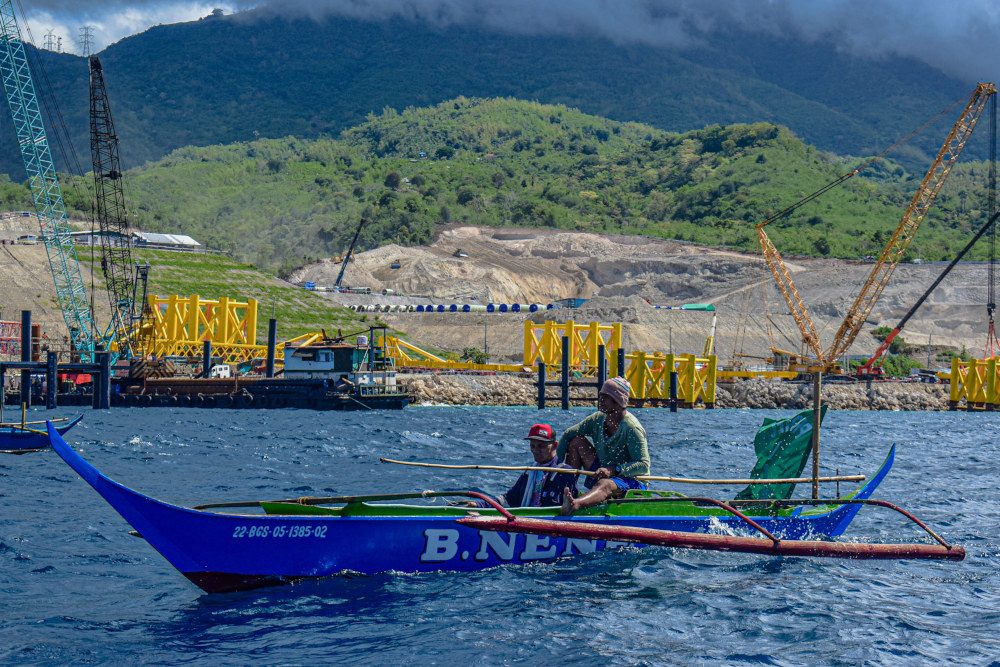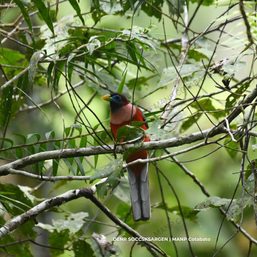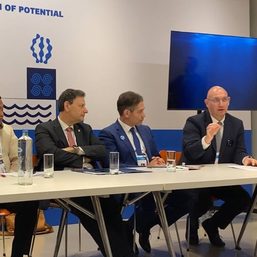SUMMARY
This is AI generated summarization, which may have errors. For context, always refer to the full article.

BATANGAS, Philippines – Local communities, environmentalists, and civil society supporters marked Earth Day in Batangas on Friday, April 22, with a fluvial protest denouncing plans to develop a whole fleet of new fossil gas and liquefied natural gas (LNG) facilities in the city, despite its proximity to an ecologically sensitive marine corridor known as the Verde Island Passage (VIP).
As a message to local and national government authorities to prioritize the protection of the VIP, 25 boats participated in the fluvial protest that was held along Batangas Bay, from Barangay Sta Clara to Barangay Ilijan, passing through the existing fossil gas power plant projects along the way.
“Today’s protest is a celebration of the rich biodiversity in the Verde Island Passage, yet also a lament for the certain destruction it would suffer should fossil gas and LNG projects in Batangas push through,” said Fr. Edwin Gariguez, lead convenor of the Protect VIP campaign network who hails from across the shore as Social Action Director of the Apostolic Vicariate of Calapan, Mindoro.
Located in the south of Luzon and at the heart of the thriving marine region known as the Coral Triangle, VIP encompasses five provinces and houses 60% of the world’s known shore fish species, over 300 coral species, and thousands of other types of sea creatures. It is recognized by marine scientists as the most biodiverse marine habitat in the world.
Fossil gas, commonly referred to as natural gas and LNG in its liquid form, is a fossil fuel falsely touted as a clean alternative to coal. VIP is the epicenter of fossil gas and LNG developments in the country, as eight of 27 proposed new plants and seven of nine planned LNG terminals nationally are located in Batangas.
Locals and environmental advocates worry that development of these projects will be made at the cost of the richness of the VIP and all livelihood dependent on it.
Two projects in their most advanced stages of development now provide a glimpse of the potential destruction fossil gas and LNG can cause – an LNG terminal of Linseed Field Power Corporation and Atlantic Gulf & Pacific Company, and an adjacent 1,700 MW gas plant of San Miguel Corporation subsidiary Excellent Energy Resources Inc (EERI), both in Barangays Ilijan and Dela Paz in Batangas City.
“Para sa proyektong ito, pinatag nila at sinira ang pampang at tinabunan ng lupa ang bahagi ng tubig na tirahan ng mga isda, paulit-ulit na mangyayari ito kung hahayaan matuloy ang lahat ng binabalak na planta at LNG terminal sa Batangas,” said Tomas Buitizon, chairperson of the Bukluran ng Mangingisda ng Batangas (BMB).
(For this project, they flattened and destroyed the riverbank and filled up part of the water where fish live with earth; this will repeatedly happen if we allow the plans of the plants and LNG terminals in Batangas to continue.)
Today, fossil gas is deemed as the new preferred fuel of energy authorities in the Philippines, who are also preparing to receive massive amounts of imported LNG, earning the ire of environmentalists and clean energy advocates.
“Fossil gas and LNG operations will create great disturbance in marine ecosystems, cause thermal pollution, and emit greenhouse gas emissions that trigger worse climate change. It’s a great wonder we are risking VIP and ignoring the climate emergency in exchange for an energy source that will only bring unreliable and costly electricity supply. Companies and financial backers behind these projects should know they are doing the people of Batangas and the Philippines no favor,” said Gerry Arances of think-tank Center for Energy, Ecology, and Development (CEED) and a co-convenor of Protect VIP.
“The people of Batangas owe our livelihood and sustenance to the thriving waters of VIP. The youth understands that any development which places the VIP in peril also threatens our chance to live in a secure and sustainable future. Our survival is at risk and this demands us to stand up for VIP. In this upcoming election, we will use our votes to ensure that this marine ecosystem and the communities thriving around it will be protected. We hope our leaders in government will also prioritize VIP and exert utmost effort to protect it from fossil gas and LNG,” said TJ Alcantara of Youth for VIP. – Rappler.com
Add a comment
How does this make you feel?





There are no comments yet. Add your comment to start the conversation.